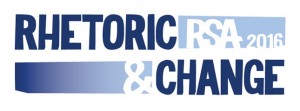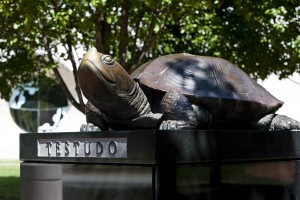Getting undergraduates to read academic journal articles can be a daunting task.

Post by: Chelona RSA Exec. Board Member, Jaclyn Bruner
Even in upper level classes, if you aren’t careful with how and when you assign the more challenging reading assignments – even a good professor can stoke the fires of a revolt. As the instructor, you know you think the reading is interesting and that the author makes good points, but how can you know if your students will engage with the readings enough to make it worthwhile?
When I was an undergraduate, my rhetoric classes were small, seminar style classes. And guess what – the majority of the readings were journal articles. I loved classes where I didn’t have to buy a textbook and where I got to read things that challenged my perspective on the world.
Now that I am the one in front of a classroom, one course in particular stands out to me. I took “Public Memory” with Brad Vivian… and he practically threw us into the deep-end. My classmates would moan and complain about the reading load, and I would nod along with them, acting as though the journal articles were long and boring to me, too – all the while, keeping my gratitude for the challenging readings to myself.
Of course, in class Dr. Vivian would walk us through the articles, pointing out different ways to engage with the Vietnam Veteran’s Memorial or explaining the concentric circles of Edward Casey’s public, collective, social, or individual memory. He would ask us if we bought the argument, what could have made it stronger, or to elaborate on something that really stuck out to us. I didn’t know it at the time, but these were some of the most formative elements of my graduate career, both as a student and as a teacher.
In that class, I learned to love the way that rhetorical criticism shone a light on specific texts. I was taught to evaluate authors’ arguments and problematize their claims. I gained confidence in understanding and critically engaging the world around me.
As I step back into the classroom this week, I have re-worked my syllabus to include academic journal articles as a part of the assigned readings. I have brought them into the classroom in the past, but only as in-class activities. This spring, I have upped the ante, and I am challenging my students to engage with the articles on their own.
So for the first two weeks, I plan to bring excerpts of journal articles into our classroom as group activities.
To keep students engaged when they are responsible for reading the articles later in the semester though, I want to use these early in-class activities to provide them tools for reading academic articles. I believe these tools can aid in developing an understanding of the complex arguments presented in academic articles. A method that has been working well for me (both in basic and upper-level courses) requires teaching the “Four Things” to look for when reading a journal article:
1) Research Questions/Argument,
2) Text,
3) Historical Info/Context, and
4) Scholarship.
In other words:
What is the author saying?
What is s/he studying?
What does the audience need to know?
Who else writes about these things?
I believe that equipping my students with these questions will help to eliminate some of the frustration that comes with trying to read and understand an academic article when preparing for class. By the end of the semester, my students will be reading a speech and a criticism of that speech, in addition to producing their own rhetorical criticism of a text they select.
In the meantime, for these early days of the semester, if a student comes to class willing to engage with the readings and ready to learn, I think the semester will turn out just fine!
 The registration deadline for RSA’s “Rhetoric & Change” in Atlanta is fast approaching!
The registration deadline for RSA’s “Rhetoric & Change” in Atlanta is fast approaching!



